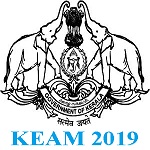 KEAM 2019 Syllabus is comprised of physics, chemistry & mathematics subjects. Commissioner of Entrance Examination (CEE), Kerala is the main conducting authority that manages the Kerala Engineering, Agriculture and Medical (KEAM) exam. It is a state level examination. This exam is organized for admission in the field of Engineering & pharmacy courses. Through KEAM exam, the candidate will get admission in government and private colleges. Here, candidates can get the detailed information about KEAM Syllabus 2019.
KEAM 2019 Syllabus is comprised of physics, chemistry & mathematics subjects. Commissioner of Entrance Examination (CEE), Kerala is the main conducting authority that manages the Kerala Engineering, Agriculture and Medical (KEAM) exam. It is a state level examination. This exam is organized for admission in the field of Engineering & pharmacy courses. Through KEAM exam, the candidate will get admission in government and private colleges. Here, candidates can get the detailed information about KEAM Syllabus 2019.
KEAM 2019 Syllabus
KEAM entrance exam will be held on April 2019. The KEAM 2019 syllabus is comprised of Higher Secondary or equivalent examinations.
The syllabus of KEAM consists of the following subjects: Mathematics, Physics & Chemistry. The complete syllabus of KEAM 2019 is mentioned below.
Physics Syllabus:
- Introduction & Management
- Description of Motion in One Dimension
- Description of Motion in Two or Three Dimension
- Laws of Motion
- Work, Energy, and Power
- Motion of System of Particles & Rigid Body Rotation
- Gravitation
- Mechanics of Solid & Fluids
- Heat & Thermodynamics
- Oscillations
- Waves
- Electrostatics
- Current Electricity
- Magnetic Effects of Current and Magnetism
- Electromagnetic Induction and Alternating Currents
- Electromagnetic Waves
- Optics
- Dual Nature of Matters & Radiations
- Atomic Nucleus
- Solids & Semiconductor Devices
- Principles of Communication Devices
Chemistry Syllabus:
- Basic Concepts & Atomic Structure: Laws of chemical combination, Atomic Structure.
- Bonding & Molecular Structure
- States of Matters: Gaseous state, Liquid State, Solid State.
- Periodic Properties of Elements & Hydrogen: Classifications of Element & Hydrogen.
- S-Block Elements & Principles of Metallurgy: Alkali metals, Alkaline earth metals, Principles of metallurgy.
- P-Block Elements: General characteristics of p-block elements, Boron, Silica, Group 18 elements, xenon.
- D- and F- Block Elements: d-Block elements, f-Block elements: Lanthanides & Actinides.
- Thermodynamics: System and surrounding, First law of thermodynamics, second law of thermodynamics.
- Chemical Equilibrium: Physical and chemical equilibria, Equilibria involving chemical systems, Concepts of acids and bases.
- Solutions: Types of solutions, Colligative properties.
- Redox Reactions and Electrochemistry: Oxidation and reduction, Faraday’s laws of electrolysis, Corrosion and its prevention.
- Chemical Kinetics
- Surface Chemistry
- Co-ordination Compounds & Organometallic
- Basic Principles, Purification & Characterization of Organic Compounds
- Hydrocarbons: Alkanes and cycloalkanes, Alkenes and alkynes, Aromatic hydrocarbons.
- Organic Reaction Mechanism: Electronic displacement in a covalent bond, Common types of organic reactions.
- Stereochemistry
- Organic Compounds with Functional Groups Containing Halogens
- Organic Compounds with Functional Groups Containing Oxygen
- Organic Compounds with Functional Groups Containing Nitrogen
- Polymers & Biomolecules
- Environmental Chemistry & Chemistry in Everyday Life
Also Check:
Mathematics Syllabus:
- Algebra: Sets, Relations, and Functions, Complex Number, Quadratic Equations, Sequences and Series, Permutations, Combinations, Binomial Theorem and Mathematical Induction, Matrices and Determinants, Linear Inequations, Mathematical Logic & Boolean Algebra.
- Trigonometry: Trigonometry Functions & Inverse Trigonometry Functions
- Geometry: Cartesian System of Rectangular Co ordinates, Lines, and Family of lines, Circles and Family of circles, Conic sections, Vector, Three Dimensional Geometry.
- Statistics: Statistics and probability.
- Calculus: Functions, Limit & Continuity, Differentiation, Application of Derivatives, Indefinite Integrals, Definite Integrals, Differential Equations.
KEAM Exam Pattern
The relative weightage of each test is in the ratio of 5:3:2 in Mathematics, Physics, and Chemistry in engineering entrance exam.
For engineering stream, two papers will be conducted. Paper 1 for Physics & Chemistry and Paper II for Mathematics. Each question paper will be of 2 hours and 30 min duration.
The KEAM exam pattern will comprise of the multiple choice type questions. Candidates will be scored four marks for each correct answer in the Engineering. One mark will be deducted from the total score for each incorrect answer.
If you have any query about KEAM 2019 Syllabus, you may leave your comments in the comment box below.
The post KEAM 2019 Syllabus, Physics, Chemistry, Mathematics appeared first on SarvGyan.

No comments:
Post a Comment